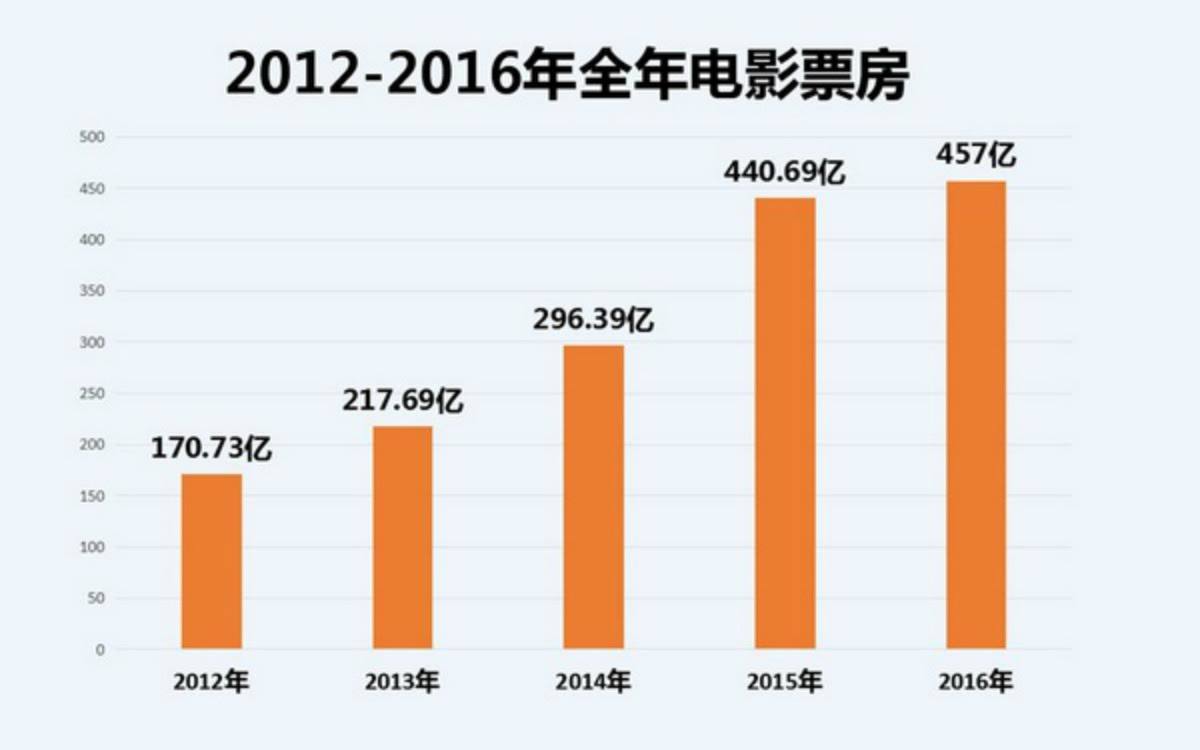The January 1 weekend was down over 20 percent year-on-year, leading to speculation that 2017 could be as challenging as 2016 for China’s box office.

Graph showing China’s total annual box office trend over the last five years in local currency (Courtesy 1905.com)
If the first public holiday of the new year is any indication of what China’s box office can expect for 2017, the world’s second-largest film industry — once predicted to exceed the North American box office as early as this year — could be in for a continuation of last year’s bumpy road.
Ticket receipts across the three-day New Year’s Holiday (元旦节) from Saturday through Monday totaled RMB 662 million (US$95 million), a 22 percent decrease from 2016’s record-breaking haul of RMB 849 million ($130 million).
Where last year’s holiday box office was led by a triumvirate of well-received releases in Detective Chinatown (唐人街探案), Mr. Six (老炮儿), and Mojin: The Lost Legend (寻龙诀), the current crop of releases sitting atop the box office charts has been plagued by poor online ratings and mixed word of mouth, likely the major cause of disappointing box office results.
Leading the way, newcomer Some Like It Hot (情圣) debuted with RMB 217 million ($31.2 million) from its first four days of release. The romantic comedy about a man’s outsize response to a mid-life crisis benefited from a deluge of cheap, subsidized tickets throughout the holiday and found the majority of its audience in lower-tiered cities outside of Beijing, Shanghai, and Guangzhou.
User ratings on Maoyan and Douban for Some Like It Hot appeared higher than recent releases such as See You Tomorrow and Railroad Tigers, but netizens speculated that a recent op-ed in the People’s Daily chiding moviegoers and critics for writing negative reviews of homegrown films may have “helped” to inflate its score.
Jackie Chan’s latest action-comedy Railroad Tigers (铁道飞虎) placed a close second over the four-day weekend with RMB 197 million ($28.3 million), lifting its cumulative total to RMB 527 million ($75.8 million).
The film has come under heavy suspicion for cooking its books or literally “injecting water” (注水), a term often used by netizens to describe films that manipulate their box office numbers.
Chan’s Sparkle Roll (Yaolai) Cinema Line, which operates just 49 cinemas across 19 Chinese cities, is Railroad Tigers’ second highest-grossing cinema chain, reporting nearly as much income from the film as Wanda, which owns 376 cineplexes.
On Saturday, Sparkle Roll cinemas earned RMB 4.29 million ($620K) in ticket sales for Railroad Tigers or about seven percent of the film’s nationwide daily total. To put that into perspective, Sparkle Roll was just the 15th highest-grossing cinema line on The Great Wall’s opening Saturday, earning only 1% of the film’s daily haul, which coincides with Sparkle Roll’s overall market share.
In third place, director Zhang Yimou’s The Great Wall (长城) earned an additional RMB 150.5 million ($21.6 million) over the four-day weekend. Reportedly budgeted at $150 million, the co-production from Legendary Pictures and Le Vision Pictures has now climbed past the RMB 1 billion ($150 million) mark thanks to weaker-than-expected competition.
The Great Wall also began its international roll-out on December 29, opening in first place in several Asian territories including Taiwan ($0.77 million), Hong Kong ($0.15 million), and Thailand ($0.17 million). The Great Wall opens in North America on February 17.
In fourth place, See You Tomorrow (摆渡人), the romantic comedy produced by Wong Kar-wai, fell 70 percent in its second weekend of release, dropping from first place to fourth and taking in just RMB 83 million ($12.0 million). The film has been besieged by toxic word of mouth, but has still managed to gross RMB 445 million ($64.0 million) thanks to solid pre-release hype and an advantageous release date. Last year marked the 25th anniversary of Wong’s Jet Tone Films, and audience response notwithstanding, See You Tomorrow represents the company’s biggest commercial success to date.
Rounding out the long weekend’s top five, Hacksaw Ridge continues its incredible Chinese run, grossing RMB 39 million ($5.6 million) on its fourth and final weekend of release. Director Mel Gibson’s World War II biopic set against the Battle of Okinawa, has now earned RMB 373 million ($53.7 million), nearly matching its North American total of $64.7 million; alongside Zootopia, it should be considered Hollywood’s most surprising China success of 2016.





